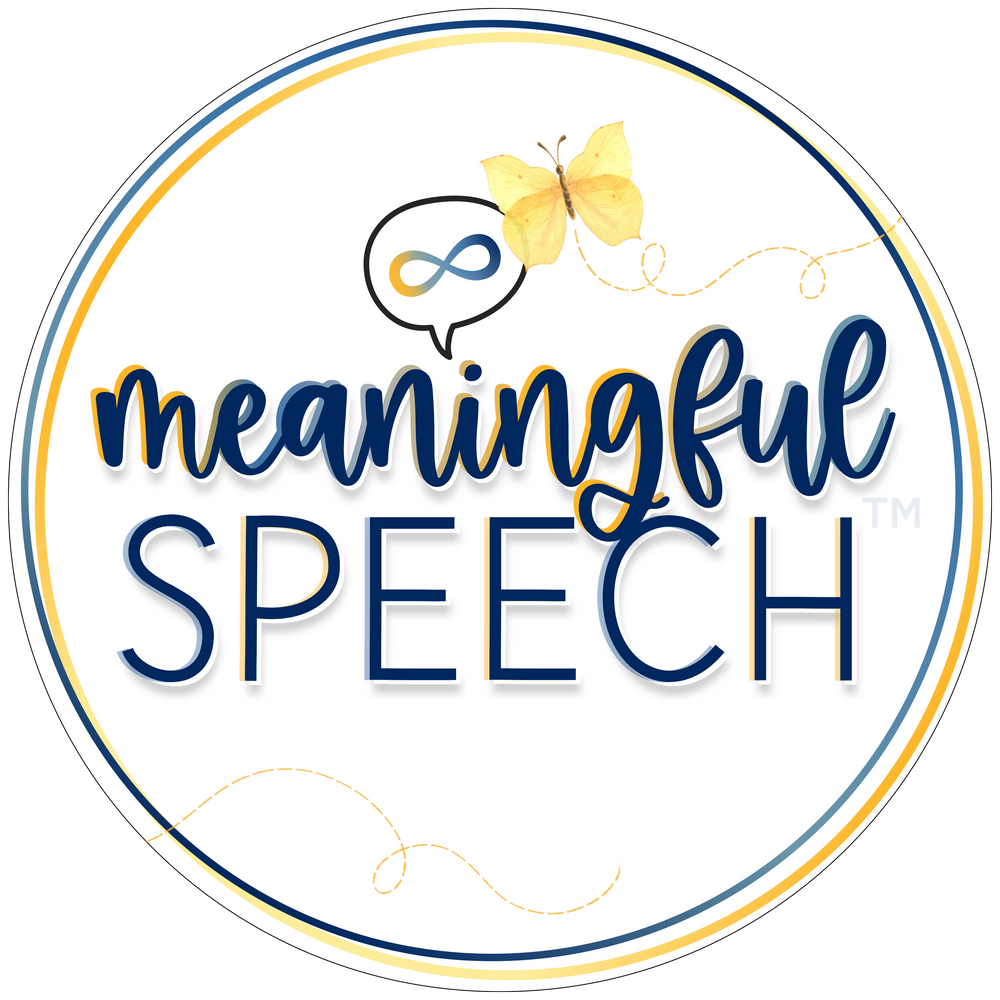Changes in play through the stages of gestalt language development
Nov 23, 2023
We no longer “work” on play or write play goals when supporting gestalt language processors. This is because neurotypical and neurodivergent children often play differently, but that doesn’t make either way wrong. Play is anything that is freely chosen, intrinsically motivating, self-directed and joyful (Lester & Russell, 2010). What’s important to remember is that there is no right way to play and all play is okay!
First, let’s review the stages of gestalt language development
(Blanc, 2012)
Stage 1: Delayed Echolalia
Scripting whole gestalts, single word gestalts, and/or intonationally defined strings of language from people, media, or books.
Example: "There's a monster at the end of the book!"
Stage 2: Mix and Match Stage or “Trimming down” (Partial Gestalts)
Mitigating larger Stage 1 gestalts into smaller chunks and also mixing and matching parts/chunks of Stage 1 gestalts into semi-unique utterances.
Examples #1 (mixing of two partial gestalts): "There's a monster + under there" = There's a monster under there.
Example #2 (Trimming down): "There's a monster."
Stage 3: Single Words and Two-Word Combinations
Breaking the script down to one word unit and/or making a new noun combination.
Example: "monster", "scary monster", "monster red"
Stages 4-6: New Original Phrases or Sentences with Beginning Grammar, More Advanced and Complex Grammar
Putting word units together to make novel phrases or sentences. At Stage 4, children are using beginning grammar. At stages 5-6, children begin using advanced and complex grammar.
Examples: “The monster goed under” (Stage 4) “The monster can’t get out” (Stage 5), “Shouldn’t he have come out from under the bed by now?” (Stage 6).
Changes through the Stages
Stages 1 & 2: Delayed Echolalia & Partial Gestalts
When supporting gestalt language processors, you may notice that play often changes as language moves through the stages of gestalt language development. When children are in the early stages of gestalt language development, they’re mainly using language verbatim as they originally heard it (Stage 1) or they’re using mitigated or trimmed down partial gestalts (Stage 2) to communicate. In both stages, their language is not self-generated which means they’re usually not able to self-generate their own pretend play schemes. So not only are play goals not necessary because there's no “right” way to play, but they’re also not appropriate for where the child is within their language development.
Some things you may notice in these early stages include:
- Reenacting scenes they’ve seen through media when playing or using gestalts or partial gestalts during play
- They may sing songs that remind them of the item or toy they’re engaging with
- They may not be ready for toy play. Instead they may prefer people play, sensory motor play or media play.
Stage 3: Single Words & Two-Word Noun Combinations:
When children are in Stage 3, they are isolating single words from previous gestalts and picking them up from their environment and combining them into two-word noun combinations (noun + noun and noun + adjective). Although these single words and two-word combinations are self-generated, their self-generated utterances are limited during play. Oftentimes, children will go back to using the earlier stages during play, even when they’re able to self-generate language. This is okay!
Stages 4-6: New Original Phrases or Sentences with Beginning Grammar, More Advanced and Complex Grammar
Pretend play often happens naturally as children move into Stages 4+. This is because children are now mainly self-generating their utterances, putting together phrases and sentences with beginning grammar, advanced and eventually complex sentences. They are able to now self-generate their own pretend play schemes whereas in the earlier stages, they were mainly using language they had originally heard from communication partners or media.
As language changes, often play does too. Either way, all play is okay! We want to meet a child where they’re at and we don’t want to force a certain type of play. Neurotypical and neurodivergent children play differently and that’s okay. It doesn’t make either way “wrong”. We don’t want to push neurotypical norms onto neurodivergent children.
Want to learn more in-depth information about how to support gestalt language processors?
1. There are many free podcasts, webinars and articles to get you started. A comprehensive list of resources can also be found on our website.
2. Consider taking the Meaningful Speech course to learn more about how your child or client processes language, how you can help support them from echolalia to self-generated (original flexible) language, child-led therapy, and neurodiversity-affirming practices. Looking for something shorter? We have a 1-hour introductory course perfect for extended family, daycare or school staff.
3. Consider taking our AAC + Gestalt Language Processing course. It will teach you how to identify, evaluate and support gestalt language processors who use AAC or who you think might benefit from AAC.
4. Look for a speech-language pathologist (SLP) who "gets it" and can help you in supporting your child's language development. Check out our registry for SLPs who understand gestalt language processing and child-led therapy.
5. Are you a school-based or private practice clinician looking for intake forms for new clients/students or creative visual reminder posters for your space? Check out the Meaningful Speech Marketplace.
